HomeReviewsRead Only Memories: Neurodiver
Read Only Memories: Neurodiver review - a bright cyberpunk noir overdosing on easter eggsSquid pro quo
Squid pro quo
Image credit:Rock Paper Shotgun / Chorus Worldwide Games
Image credit:Rock Paper Shotgun / Chorus Worldwide Games
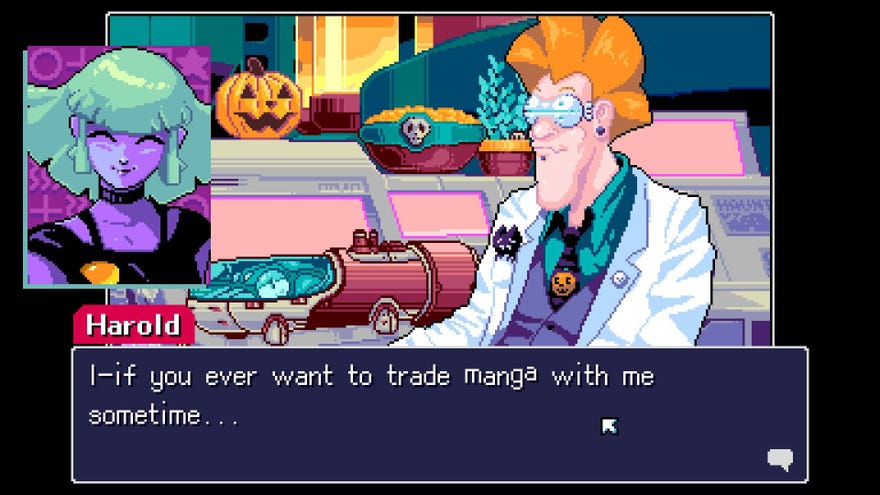
The characters inRead Only Memories: Neurodiverare deeply into anime. They love manga and figurines and trashy movies and horror novels. The interests of the game’s creators have not so much leaked into this fictional world as they have been generously pumped in with an industrial hose. Even the visual novel’s loading screens take the form of those two-second intermission panels that flash up to signal an anime’s commercial break, complete with random characters announcing the game’s name (“Neurodiver!"). In moments like that, the passion is endearing. But in other places, it is overwhelming. Neurodiver is obsessed with media in a way that often distracted me from the bright-eyed cyberpunk story it wants to tell.
Read Only Memories: NEURODIVER - Gameplay Trailer - Coming Summer 2023Watch on YouTube
Read Only Memories: NEURODIVER - Gameplay Trailer - Coming Summer 2023

The stylish pixel art does a lot to get you on board. It’s not afraid of splashing the world with vibrant colours, and the broad range of facial expressions for characters complements their moments of shock, embarrassment, sleepiness and anger. The environments are adorned with smoothly dithering gradients, lush with pixel ginkgo trees and cyberpunk lamp posts. I got a giggle from the low-res hand-waving of a figure in the distance, communicated with just a handful of pixels, an exercise in creative limitations that helps sell the old schooladventure gamesfeel of everything.
The presentation does everything it can, through the colour schemes and costume designs, to suggest Konami’s Snatcher through the lens of JoJo’s Bizarre Adventure. And in the freer moments, when you’re moving from location to location, it successfully elicits the classic adventure game feeling of creating an internal map of rooms from clicking on doors and stairwells, elevators and reception desks. It’s unafraid to make a daily routine of navigating your workplace, letting you learn the world’s lo-fi geography.
Image credit:Rock Paper Shotgun / Chorus Worldwide Games
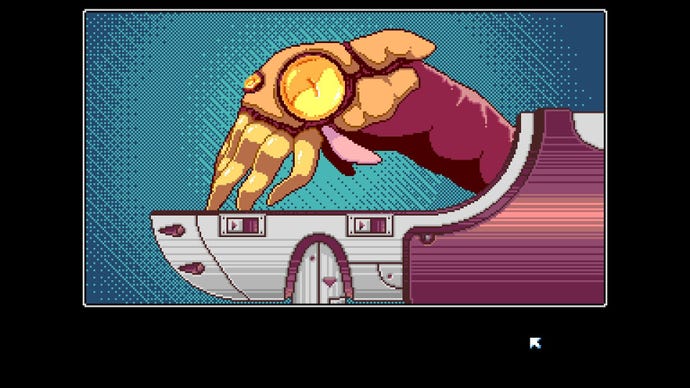
Thematically we’re stomping on some similar ground to this game’s predecessor,2064: Read Only Memories. Body modification, corporate overreach, privacy, personal freedom, gender norms - all of these topics come up, sometimes subtly, often not-so-subtly. But most of that is background static to the main thrust of the tale, which is about memory and personal identity. You spend much of your time polishing the memories of suspects and victims brave enough to volunteer having a weird squid attached to their arm. Among their scrambled thoughts lie childhood nostalgia, familial treasures and incidences of neo-criminality. This deeper character-focused stuff often isn’t lingered on, however, and much of the memory-manipulating is there to serve a fast-moving noir plot.
Image credit:Rock Paper Shotgun / Chorus Worldwide Games
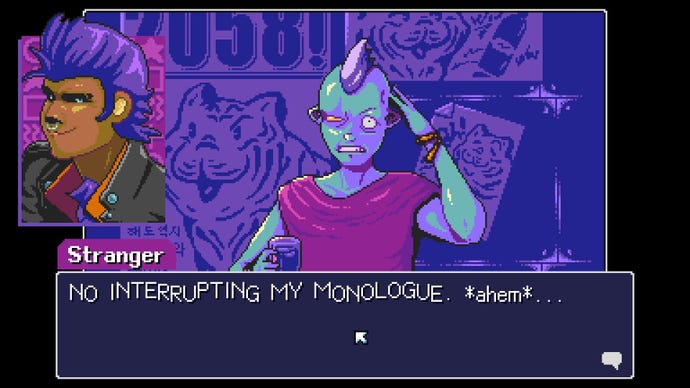
Luna is a manic pixie squid girl who sets the quirky bar for all other characters to follow, the happy-go-lucky sensitive type who will always “do my best!” Her jacked biobot-bodyguard fulfils the archetype of steady-headed stoic fond of ellipses. Your boss, Fortuna, is a context-twisting manager, an obvious harbour of secrets. There is some sense of depth from Tomcat, a classic white hat hacker type, when you see flashbacks of the whizkid’s late sister encouraging a monumental hack. But even this falls into expected grooves.
Voice acting is mostly well-delivered (questionable “British” accents aside), but many characters are so EXTRA they become hard to stomach. Harold, a co-worker in the psionics labs you frequent, is particularly obnoxious and grating. That’s intentional, I think. But it also makes me reluctant to endure a scene with him. Some more basic problems of voice direction crop up, like when Luna exclaims “the Golden Gate bridge!” with all the wide-eyed wonder of a childish tourist, as if seeing it for the first time. In truth, she makes this comment from her apartment balcony. She has seen this bridge every day for years.
Image credit:Rock Paper Shotgun / Chorus Worldwide Games

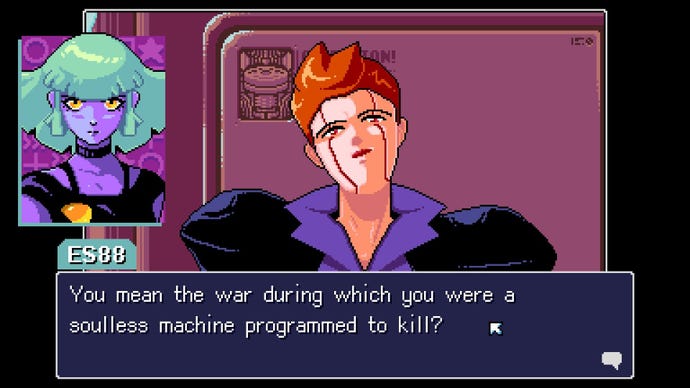
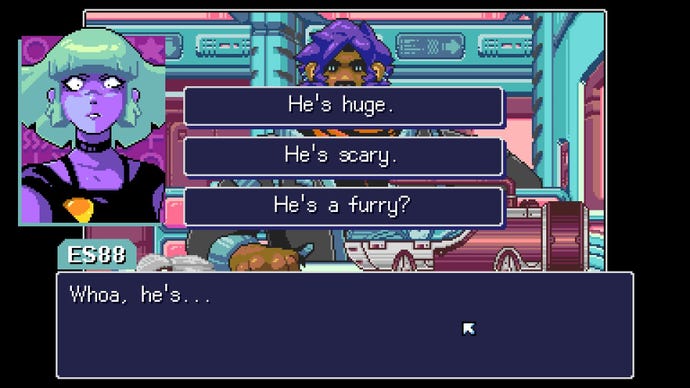

Like I say, its presentation is stylish and meticulous, full of appreciative details. The glitchy animated text when characters are scared or angry is as neat here as in any other dialogue driven game it appears in, as is the rolling wave text that shows when characters are crooning in delight. It’s fun and effective, the video game equivalent of speech bubble variation in comics. But being honest, I didn’t have the mental fortitude to hang out with these people long enough to read their words to the end, slickly animated or not. Because I am basically having an allergic reaction to the game’s obsession with being “meta”. Let me explain.
Image credit:Rock Paper Shotgun / Chorus Worldwide Games
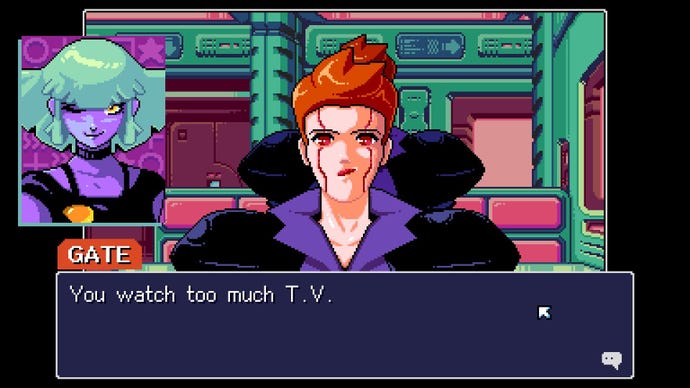
For some players this kind of easter egging can summon a spike of comfort and joy as they dutifully perform theLeo diCaprio finger-point. For me, the relentless referencing quickly broke the story’s fragile container. In adventure games, a lot relies on keeping the player trapped in your world. And how can you feasibly stay in one world if the game keeps reminding you that other worlds exist? This is also why I winced when Neurodiver’s characters would say things like “she sounds like a comic book character!” or “that sounds like a setup for a horror novel” or “but this isn’t an anime, this is real life!”. To some, these are meta raspberries to blow, fun winks to wink, all easily forgotten. For me, it feels like Neurodiver only wants to flirt with my disbelief, rather than commit to suspending it.